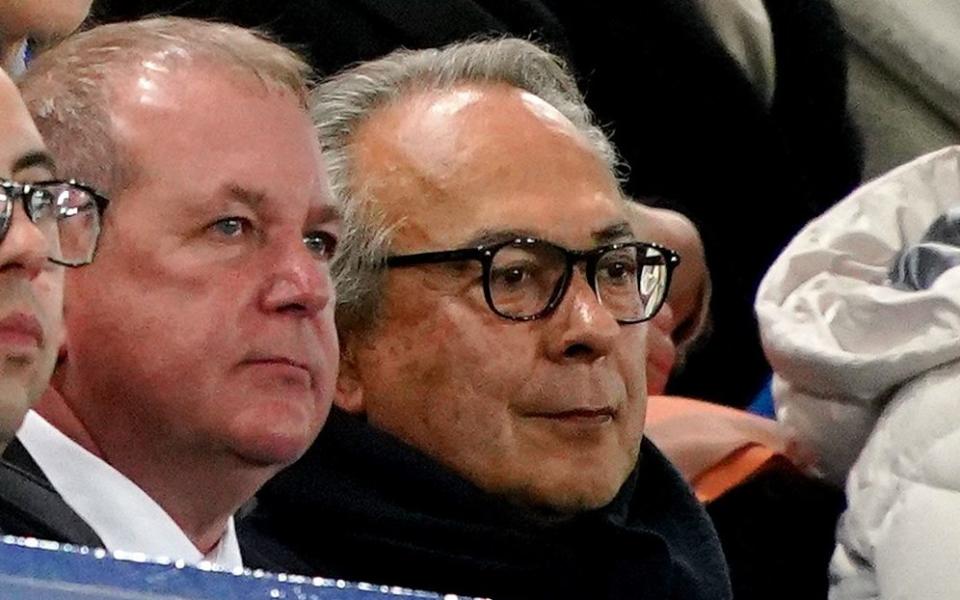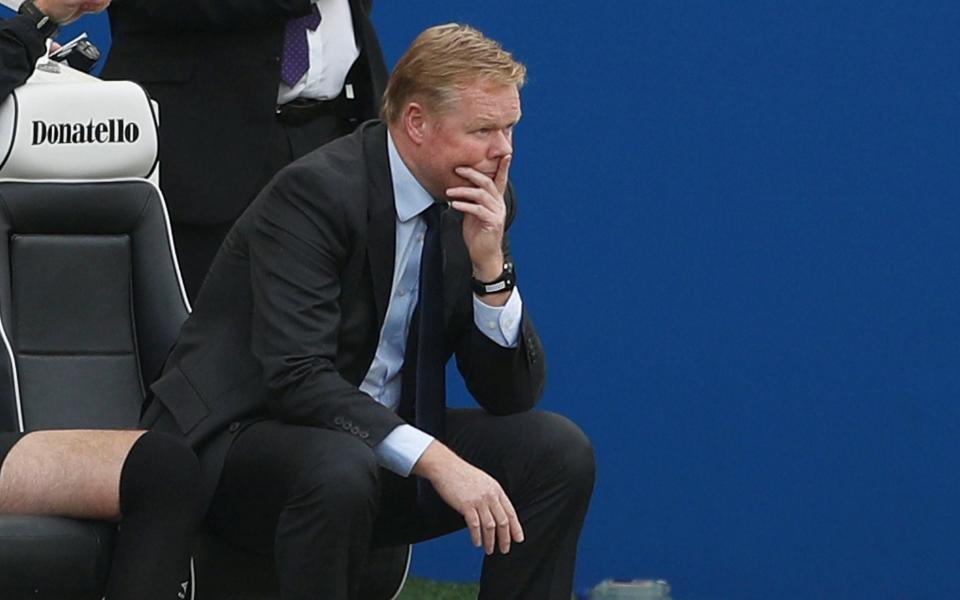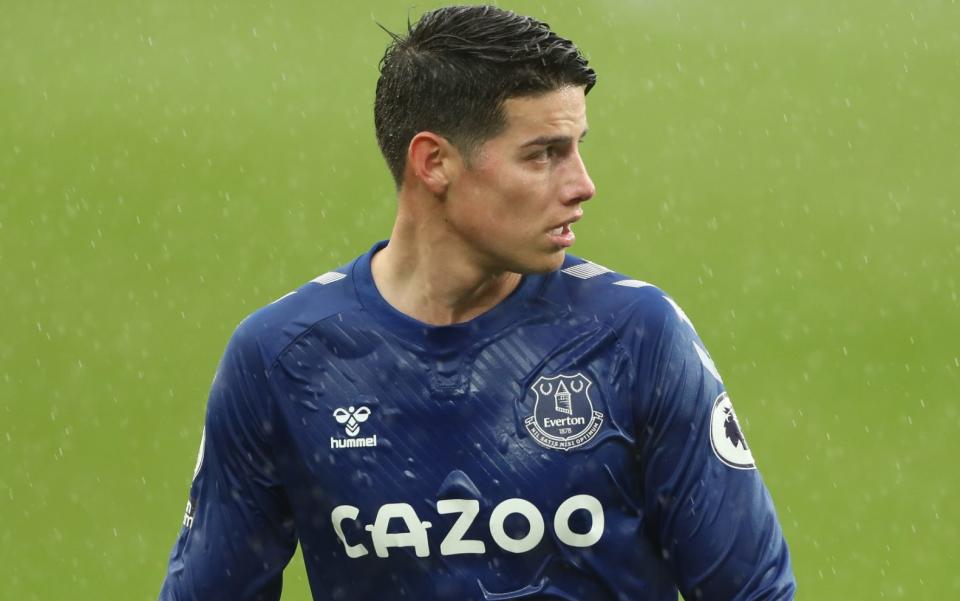Farhad Moshiri went crazy in pursuit of Premier League glory – Everton are paying price

It requires a leap of imagination, but consider a world in which Sean Dyche is leading an Everton title challenge; top of the league, head-to-head with Manchester City.
Everton are docked 10 points for breaking Profit and Sustainability guidelines while City, charged a month earlier with an additional 114 breaches of rule W.82.1, can prepare their next title procession. One suspects the outcry regarding fairness, proportionality and integrity would be earsplitting.
The above scenario may seem outrageously hypothetical given the vastly different trajectories of Everton and Manchester City since Farhad Moshiri and Sheikh Mansour ploughed billions into their respective clubs. It is damning on Everton’s misuse of funds that few can picture them as a title challenger. That is because while City used their vast resources to generate extravagant firework displays, Moshiri’s wealth created the most expensive bonfire in English football history.
City’s success has given them a power and a defensive shield which Goodison Park does not have, so for legal and political reasons Everton feel like an easier target for a Premier League board under pressure from its current and previous stakeholders – especially those who have made living within their means non-negotiable – to show its claws.
That does not alter the fact the moral of this unedifying story is if you are going to provoke a Premier League charge for cheating, go big, go bold and delay the possibility of a day of reckoning by years while you continue winning every major competition.
Not that Everton deserve an outpouring of sympathy from the other 18 Premier Leagues and clubs and beyond. Far from it. They are where they are for entirely self-inflicted reasons, falling foul of the Premier League rules as their profligacy yielded no profit.
Moshiri mapped out an escape plan before an independent commission delivered Everton’s 10-point deduction. It appears that he plans to leave the debris for others on the presumption that the sale to 777 Partners proceeds. But the stench from his seven-year reign will linger beyond today’s judgement.
Moshiri smoked £700 million and Evertonians have nothing to shout about for all the hassle, save for the sight of a shiny new stadium emerging through the dust clouds.
By the end of his reign, Moshiri’s desperate hunt for cash – to survive more than thrive – led Everton to this 10-point deduction. By all measures he has been a calamitous figurehead.
In the 13 years prior to Moshiri’s arrival, Everton enjoyed 10 top-seven finishes. In his seven years in charge, they have hit that height once, mastering the misstep. They have become the example other moneyed clubs seek to learn from by doing the opposite.
Rule one for any cash-rich team is to competently execute a coherent and consistent recruitment plan, an aspiration which eluded Moshiri when his epic transfer splurge built an expensive, unbalanced and faltering team reconstructed by eight different coaches over seven years.
In the season before Moshiri became majority shareholder, Everton’s wage bill was £77.5 million – a campaign in which Roberto Martinez finished 11th. That figure peaked at £182.6 million in 2021. Everton have been in an ongoing battle to cut costs and avoid relegation ever since.
From the outset, Everton’s deals under Moshiri were generally abject, although no-one could question his intentions when his initial appointments were those he believed the best in class: manager Ronald Koeman had just led Southampton to sixth in the Premier League and director of football Steve Walsh was credited with overseeing the scouting network which yielded Leicester City’s unlikely title.

In what would become a theme, Moshiri was seduced by the names and reputations more than thorough due diligence, little thought given as to whether those leading football operations could gel.
Naivety, gullibility and whimsy cost Moshiri a fortune as the pressure for immediate results squeezed any semblance of a long-term plan.
A cycle of bust without the boom
In Moshiri’s first summer Everton paid £22.5 million for Yannick Bolasie, £20 million for Morgan Schneiderlin and £9 million for Ashley Williams. Williams was a month shy of his 32nd birthday and given a three-year deal. Everton’s wage bill soared to more than £100 million.
Terrifyingly, they look like bargains compared to what followed.
In the summer of 2018, Koeman and Walsh squandered £135 million, the most expensive signing being Gylfli Sigurdsson for £40 million. Wayne Rooney returned on a free transfer and the wage bill rose to £145.5 million. Koeman was sacked after a poor start to the season that October, the second of Moshiri’s six expensive dismissals.
Walsh did not last long after Sam Allardyce spent a combined £50 million for Cenk Tosun and Theo Walcott to keep Everton in the Premier League, before leaving them as an expensive farewell gift that his successor Marco Silva and the next director of football, Marcel Brands, didn’t want.
The hiring and firing never stopped, Everton caught in a cycle of bust without any boom.
With the exception of Carlo Ancelotti – indulged with the likes of James Rodriguez and Brazilian midfielder Allan on contracts which the club could not really afford – successive Everton managers kept paying the price as they failed to repair the damage of the haphazard transfer policy of those first windows.

The combined cost of managerial pay-offs – Silva, Rafa Benitez and Frank Lampard completed the sextet of Moshiri sackings – is about £50 million. Walsh and Brands needed hefty pay-offs after being given lucrative deals, too.
Everton’s board members took a combined salary of £770,000 a year in 2016. By 2019, this had increased to £3.61 million – quite the investment without the anticipated rewards of European football.
No matter how often the facts of Moshiri’s financial catastrophe are laid bare, they never cease to be jaw dropping.
Everton posted relatively meagre losses of £4.1 million shortly before Moshiri’s cash injection. Since 2017, that figure has swelled to a combined £429.6 million. The last three accounting years until July 2022, with cumulative losses of £304 million, prompted the Premier League to act on a breach of rule W.82.1, whereby losses over a three-year period must not exceed £105 million.
Attempts to justify the losses
Everton’s defence is they have always been transparent about their spending and have reduced their costs and wage bill over the past two years.
Regardless of their moderations, questions continued to be asked about how they could afford to keep living above their means without censure.
Recently, every time Everton published their accounts rival clubs rolled their eyes and wondered what kind of voodoo economics was practised to justify the extraordinary losses. Everton claimed at least £170 million of potential earnings were written off due to the Covid-pandemic, a figure other Premier League clubs consider a strategic overcalculation. They have also spent heavily on infrastructure in constructing their new dockside arena – an expense which has regularly been part of their mitigation when asked to explain their losses – while their charity, Everton in the Community, is lauded for its sterling work.
But as Moshiri kept offering personal loans of up to £350 million while being less than transparent regarding all of the sources of his income, the demands for more forensic examination intensified.
In May, 2022, Leeds United and Burnley – rivals in a relegation fight – threatened legal action as they argued Moshiri was circumnavigating the rules to retain their best players on big contracts and preserve Premier League status.
Everton said they were working with the Premier League to ensure they were compliant and so avoided a rebuke. When they sold Lucas Digne to Aston Villa for £25 million in January, 2022, they were engaged in dialogue with the Premier League as to how much they were allowed to re-invest in the squad.
The Premier League charged Everton in March, 2023. Everton were shocked at the timing given their ongoing discussions regarding compliance and a decrease on the £372 million losses accrued over three years up to 2021.
The political interpretation is that the new Premier League chair, Alisson Brittain, realised there was too much leniency in the past. Everton argue the timing of the charges – in the midst of demands for an independent regulator for English football – cannot be shrugged off as mere coincidence.
Whatever their grievances about the process, they cannot escape the consequence of executive failure.
Now the Premier League has pursued and secured its first meaningful scalp. But the pressure will increase for the second momentous hearing. From the outset, this has felt like a test case, the rest of the top flight anticipating suitable punishment and legal precedent. Everton’s predicament serves as a warning there will be accountability for those deemed to have broken the rules.

